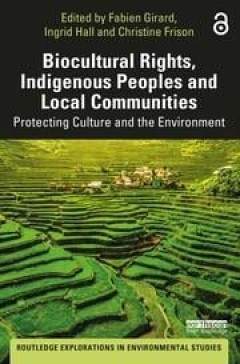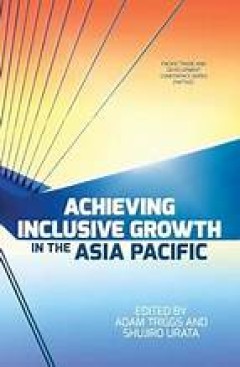Filter by

Big Data, Pharmacogenomics and Real-World Research in Pharmacology
they are collections of at least ten articles, all centered on a particular subject. With their unique mix of varied contributions from Original Research to Review Articles, Frontiers Research Topics unify the most influential researchers, the latest key findings and historical advances in a hot research area! Find out more on how to host your own Frontiers Research Topic or contribute to one a…
- Edition
- -
- ISBN/ISSN
- 9782889660667
- Collation
- 165
- Series Title
- -
- Call Number
- -

Bibliometric Studies and Worldwide Research Trends on Global Health
Global health, conceived as a discipline, aims to train, research and respond to problems of a transboundary nature in order to improve health and health equity at the global level. The current worldwide situation is ruled by globalization, and therefore the concept of global health involves not only health-related issues but also those related to the environment and climate change
- Edition
- -
- ISBN/ISSN
- 9783039430949
- Collation
- 326
- Series Title
- -
- Call Number
- -

Beverage Consumption Habits around the World: Association with Total Water an…
Inadequate hydration is a public health issue that imposes a significant economic burden. In Spain, data of total water intake (TWI) are scarce. There is a clear need for a national study that quantifies water and beverage intakes and explores associations between the types of beverages and energy intakes
- Edition
- -
- ISBN/ISSN
- 9783038426356
- Collation
- XII, 292
- Series Title
- -
- Call Number
- -

Biocultural Rights, Indigenous Peoples and Local Communities: Protecting Cult…
This volume presents a comprehensive overview of biocultural rights, examining how we can promote the role of indigenous peoples and local communities as environmental stewards and how we can ensure that their ways of life are protected. With Biocultural Community Protocols (BCPs) or Community Protocols (CPs) being increasingly seen as a powerful way of tackling this immense challenge, this …
- Edition
- -
- ISBN/ISSN
- 9781000593624
- Collation
- 380
- Series Title
- -
- Call Number
- -

A Collection in Context: Kommentierte Edition der Briefe und Dokumente Sammlu…
The first volume of the Tu?bingen Numismatic Studies series examines the collection of Karl von Scha?ffer, comprising almost 3000 numismatic objects, which came into the possession of the University of Tu?bingen in 1888, in the context of the history of science. The edition of the complete collection documentation is evaluated by contributions on the history of the university collection, a biog…
- Edition
- -
- ISBN/ISSN
- 978-3-947251-01-8
- Collation
- 199 hlm
- Series Title
- -
- Call Number
- -

Afterlives of war
Afterlives of war documents the lives and historical pursuits of the generations who grew up in Australia, Britain and Germany after the First World War. Although they were not direct witnesses to the conflict, they experienced its effects from their earliest years. Based on ninety oral history interviews and observation during the First World War Centenary, this pioneering study reveals the co…
- Edition
- -
- ISBN/ISSN
- -
- Collation
- -
- Series Title
- -
- Call Number
- -

Achieving Inclusive Growth in the Asia Pacific (Paftad)
The world’s developed economies are experiencing a sharp backlash against globalisation, and it appears to be contagious. Will Asia catch it next? Asia has seen spectacular growth in recent decades. It has benefited substantially from global trade, finance, openness and the rules-based international order. But much of the growth Asia has enjoyed has not been shared. It has not been inclusive …
- Edition
- -
- ISBN/ISSN
- 978-1760463816
- Collation
- oer.unej.ac.id
- Series Title
- -
- Call Number
- -

A Greek State in Formation: The Origins of Civilization in Mycenaean Pylos
Although the Mycenaean civilization of the Greek Bronze Age was identified 150 years ago, its origins remain obscure. Jack L. Davis, codirector of excavations at the Palace of Nestor at Pylos, takes readers on a tour of the beginnings of Mycenaean civilization through a case study of this important site. In collaboration with codirector Sharon R. Stocker, Davis demonstrates that this ancient pl…
- Edition
- -
- ISBN/ISSN
- 9780520387256
- Collation
- 168 hlm
- Series Title
- -
- Call Number
- -

A Delicate Choreography: Kinship Practices and Incest Discourses in the West …
The origins of the incest taboo have puzzled many of the most influential minds of the West, from Plutarch to St. Augustine, St. Thomas Aquinas, Martin Luther, David Hume, Lewis Henry Morgan, Sigmund Freud, Emile Durkheim, Edward Westermarck, and Claude Le?vi-Strauss. This book puts the discussion of incest on a new foundation. It is the first attempt to thoroughly examine the rich literature, …
- Edition
- -
- ISBN/ISSN
- 978-3111009247
- Collation
- 1134 hlm
- Series Title
- -
- Call Number
- -

Accustomed to Obedience? Classical Ionia and the Aegean World, 480–294 BCE
Many histories of Ancient Greece center their stories on Athens, but what would that history look like if they didn't? There is another way to tell this story, one that situates Greek history in terms of the relationships between smaller Greek cities and in contact with the wider Mediterranean. In this book, author Joshua P. Nudell offers a new history of the period from the Persian wars to war…
- Edition
- -
- ISBN/ISSN
- 978-0-472-90387-0
- Collation
- oer.unej.ac.id
- Series Title
- -
- Call Number
- -
 Computer Science, Information & General Works
Computer Science, Information & General Works  Philosophy & Psychology
Philosophy & Psychology  Religion
Religion  Social Sciences
Social Sciences  Language
Language  Pure Science
Pure Science  Applied Sciences
Applied Sciences  Art & Recreation
Art & Recreation  Literature
Literature  History & Geography
History & Geography